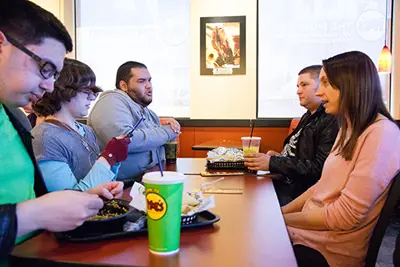He's a Quiet Math Major; She's an Outgoing Psychology Major
 Image by K. Webster
Image by K. Webster
09/15/2017
By Katharine Webster
Nick Raymond is a quiet, high-achieving math major who wants to be an actuary. He’s in the Honors College, maintains a perfect 4.0 GPA and won a scholarship set up by famed actress Meryl Streep.
His idea of a good time is reading a classic adventure story. Right now, it’s “The Count of Monte Cristo,” assigned by Honors College Dean Jim Canning as part of a $1,000 reading fellowship.
“I can’t put it down,” he says.
Nick’s younger sister, Elizabeth, is a bubbly, outgoing psychology major who likes to hang out at Starbucks and chat with friends between classes.
“The people here are really friendly and fun,” she says.
In fact, to the casual observer, brother and sister have little in common – except that they share a genetic condition, spinal muscular atrophy, that requires them to use wheelchairs.
The Raymond siblings are living proof that a disability doesn’t define you or limit your potential. They’re doing just fine, thank you – and they love UMass Lowell, which is a convenient 15 minutes from their home in Chelmsford.
Nick loves an academic challenge. He won a $4,000 Co-op Scholarship as part of his acceptance package four years ago. He used it to do research on a new, lightning-fast type of transistor the summer after his freshman year in the lab of Prof. Martin Margala, chairman of the Electrical and Computer Engineering Department.
His sophomore year, he won the first Prof. Joan Hertzberg Scholarship for a student who excels in math. The scholarship was established by Streep to memorialize a college classmate and friend.
Now a senior, Nick is working on his honors capstone, with Math Prof. Ken Levasseur, about the unsolved twin prime conjecture – a theory that there are infinite pairs of prime numbers that are exactly two apart (i.e., 5 and 7, 11 and 13, 17 and 19). He’s also taking Levasseur’s honors class in Mathematical Problem Solving, which culminates with students taking the Putnam Competition, the most prestigious – and difficult – math competition in North America.
On top of that and the reading fellowship with Canning, Nick is taking his first actuarial exams. He plans to go on for his master's degree in statistics and then get a job with a company that will let him work remotely some of the time. He chose the profession of actuary because it’s one of the lowest-stress, highest-paying and most satisfying jobs for math majors.
Does his condition make college harder for him than for other students? Maybe, maybe not. He mostly avoids classes that require long papers, because typing with a mouse and an on-screen keyboard takes a long time – but he’s proud of the results when he does write a long paper. And he paces himself, taking four classes each fall and spring and two classes every summer.
“I don’t feel all the social pressures, so I think I can get more done,” he says. “As far as the physical limitations, it can be hard to do some things: I can’t pull all-nighters.”
His mom accompanies him most of the time and takes notes in some classes. Elizabeth prefers having a personal attendant, because occasionally their mom acts like – well, a mom.
“She’s very parental,” Elizabeth says, laughter bubbling up. “When I went to drop off my final, it was a rainy day, and she was like, ‘Don’t go in the puddles, Elizabeth!’ She yelled it out across campus. I was so embarrassed.”
Now a sophomore, Elizabeth loves studying psychology – child and adolescent, personality, developmental and abnormal. Her own experiences have given her great empathy for other teenagers.
“I decided on psychology because I’ve always been interested in helping people, but I couldn’t think of something I could do physically,” she says. “I’d like to work with kids, especially adolescent age, because that’s a difficult time in somebody’s life, so if you can help them through that time, I think overall it will help their life become better.”
Elizabeth plans to join a student club this year and hopes to live in a South Campus dorm at some point, but she’s still working on the logistics. Although she and Nick both commute together from home, they don’t see each other much at school: She’s on South Campus and he’s on North, except when he comes to the Honors College to meet with Canning or attend an event.
“Every once in a while I’ll see Nick walking around and I’ll say, ‘Hey!’ But other than that, I don’t really see him that much – which is fine, too, because I see plenty of him at home,” she laughs.



